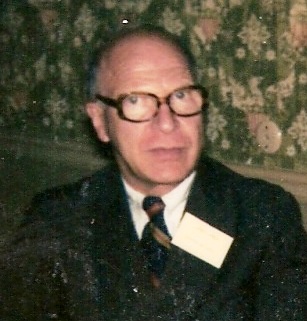The Princeton Project
Digitizing a Sexual Civil Liberties Collection
Sexual Rights Advocacy from 1950 to 2000
 Arthur
C. Warner (1918 - 2007) advocated for the privacy rights of consenting
adults for five decades. As a child, he lived with his parents in
Princeton, New Jersey. Warner later attended and graduated from
Princeton University after which he received a law degree and doctoral
degree in history from Harvard University. After teaching history
for several years at various universities, Warner returned to the family
home in Princeton where he lived until his death in 2007.
Arthur
C. Warner (1918 - 2007) advocated for the privacy rights of consenting
adults for five decades. As a child, he lived with his parents in
Princeton, New Jersey. Warner later attended and graduated from
Princeton University after which he received a law degree and doctoral
degree in history from Harvard University. After teaching history
for several years at various universities, Warner returned to the family
home in Princeton where he lived until his death in 2007.Warner's desire to be an attorney was thwarted when he was arrested by an undercover vice officer after a conversation about engaging in consenting adult sex. Such an offense was grounds in many state to deny a law graduate admission to the bar. During the 1950s and 1960s right-wing crusades to remove homosexuals from the military and federal civil service coincided with homophobic policies and practices of state and local police departments throughout the nation which collectively caused the arrests of tens of thousands of suspected homosexuals annually under laws punishing sodomy, lewd conduct, and sexual solicitation. Most arrestees would plea bargain to a lesser offense in order to avoid jail, registering as sex offenders, or losing jobs and professional licenses. Few would fight the charges against them, much less challenge the constitutionality of the laws themselves and a system of discriminatory enforcement. Being openly gay, even without and arrest or conviction, was a basis for denying a law graudate admission to the bar until the late 1970s. (Photo: Warner in 1981)
Warner, however, decided to devote his life to advancing sexual civil liberties through law reform. He organized legal committees in some of the early homophile organizations in the 1950s and 1960s. In 1970, he founded the National Committee for Sexual Civil Liberties and, through collaboration with academics and practitioners in a variety of disciplines, he advocated for legislative reform on a state-by-state basis. The committee also filed legal briefs in test cases, seeking judicial declarations that these sex laws were unconstitutional. Although there were losses, there were also many victories on both the legislative and judicial fronts. In 1981, the National Committee changed its name to the American Association for Personal Privacy -- a strategic decision to emphasize the privacy rights of consentingt adults, regardless of gender or sexual orientation.
Before he died in 2007, Warner donated his papers to Princeton University as a way of preserving written materials that documented the quest of Warner and his like-minded brethren who tirelessly fought for sexual law reform for several decades. The Warner collection houses about 50,000 pages of historical materials -- letters, commentaries, court briefs, and legislative materials. Because of the time and cost of travel to Princeton, only a handful of scholars, historians, and book authors view the collection each year.
Thomas F. Coleman became a member of the National Committee for Sexual Civil Liberties in 1972. That same year, Coleman was the founding president of the first gay law student's association in the nation. He served as co-chair of the committee with Warner from 1974 to 1981 when he resigned as co-chair in order to become executive director of the Governor's Commission on Personal Privacy in California. However, Coleman continued to collaborate with Warner on a variety of cases and projects for the next two decades.
In November 2023, Coleman approached the Seeley G. Mudd Manuscript Library at Princeton with a proposal to digitize the most important materials in the Warner collection so that these historical papers would be available to scholars, students, historians, and authors anywhere in the world. Coleman reviewed some 40,000 pages of materials to identify those most worthy of being digitized. Many of those pages are now available online.
In addition to the digitized pages available through the university's website, Spectrum Institute has uploaded documents pertaining to gay rights legal advocacy from the 1950s through the 1990s. The papers fall into three categories: the legal committee of the North American Conference of Homophile Organizations (1950s - 1960s), the National Committee for Sexual Civil Liberties (1971 - 1981), and the American Association for Personal Privacy (1982 - 2000). Links to these papers are found below. Biographical information about Arthur Warner is also available.